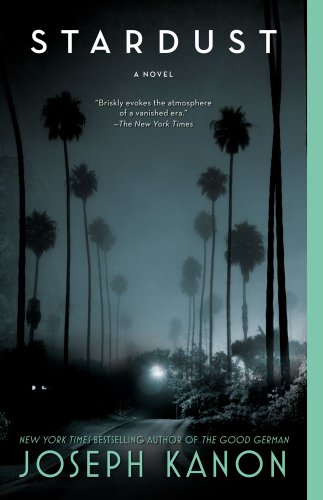Reveiw: Stardust, by Joseph Kanon
Joseph Kanon's Stardust is a delicious crime drama wrapped in the pure American mink coat of late 1940s Hollywood. While both the film and period terminology are excessively specific, making it a slightly difficult read for anyone unfamiliar with the backlots (or anyone trying to keep track of the real, historical figures and those of Kanon's imagining), the structure is a classic with a twist.
Our protagonist Ben Collier doesn't have too many layers and his drives seem pretty basic, but he's a cool head in a very hot place and time. Ironically, his army composure and quickness of mind keep him above many of the Hollywood snares, keeping (as it were) stardust from getting into his eyes. While investigating his estranged brother's death, Collier enlists the help of everyone from the head of the studio he's working for, to the local German community (rife with Communists and ex-Communists), to a sneaky columnist, to the FBI.
But some of Collier's best help comes in the form of the most developed of Kanon's characters, Bunny Jenkins - gay former-child-star, now assistant to studio head Sol Lasner. For Bunny, the industry and the studio are everything, and wherever a problem may arise to obstruct that beautiful truth--be it an ugly dress or Joseph McCarthy's witch-hunting predecessor--Bunny has a fix for it. Fortunately for Collier, Bunny ends up on his side.
Though it took me a while to get through, I did like this book. I only wish that I might have been more versed in the time period before I took it up.
Our protagonist Ben Collier doesn't have too many layers and his drives seem pretty basic, but he's a cool head in a very hot place and time. Ironically, his army composure and quickness of mind keep him above many of the Hollywood snares, keeping (as it were) stardust from getting into his eyes. While investigating his estranged brother's death, Collier enlists the help of everyone from the head of the studio he's working for, to the local German community (rife with Communists and ex-Communists), to a sneaky columnist, to the FBI.
But some of Collier's best help comes in the form of the most developed of Kanon's characters, Bunny Jenkins - gay former-child-star, now assistant to studio head Sol Lasner. For Bunny, the industry and the studio are everything, and wherever a problem may arise to obstruct that beautiful truth--be it an ugly dress or Joseph McCarthy's witch-hunting predecessor--Bunny has a fix for it. Fortunately for Collier, Bunny ends up on his side.
Though it took me a while to get through, I did like this book. I only wish that I might have been more versed in the time period before I took it up.

I will need to get beluga cam!
ReplyDelete...I don't understand...
ReplyDelete